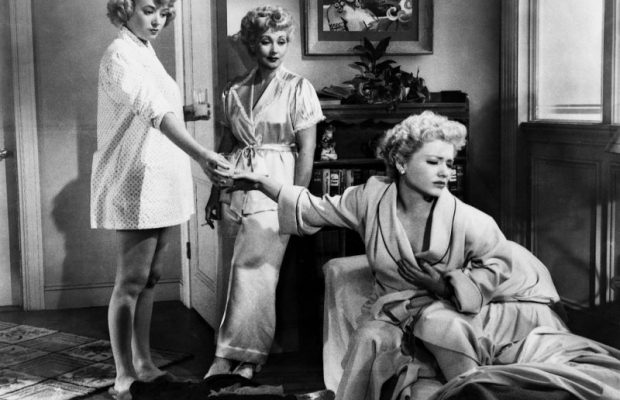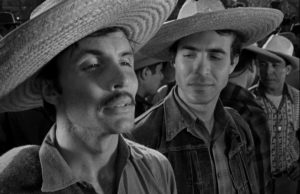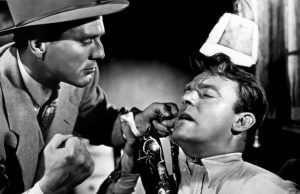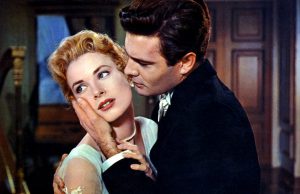The Blue Gardenia (1953)

 |
Run Time: 90 min. | b/w
Director: Fritz Lang Stars: Anne Baxter, Richard Conte, Ann Sothern, Raymond Burr Genres: Drama | Film-noir |
| Storyline A slick mystery-drama about a woman involved in the murder of a heel, and her efforts to prove her innocence. Conte lends staunch support, Burr’s a great “heavy”, and Nat King Cole sings the title song. |
|










Really excellent film, elegant, well constructed and atmospheric. Beautifully written script, directing, photography, art direction, soundtrack editing, performances, etc. A real masterpiece. I am surprised that so many people who review it here seem not to grasp it. They complain about lack of suspense because it doesn’t use hackneyed noir film devices, but the film is not about that. It’s about Anne Baxter, the world through her point of view. Her life is a beautiful dream of hopes of love and happiness for the future, which turns into a horrible nightmare that spirals downward with sickening realism and pathos. Snappy characters throughout, but they are not "wasted", miscast or otherwise ill-used. They are perfectly balanced in a skilled script that is not about actors chewing the scenery, but is a real film, an art film, by the master Fritz Lang, whose every decision in creating this film up to the smallest detail seems to me to be highly intentional. Highly recommended.
Norah, a young, attractive woman (played by Anne Baxter), gets a letter from her overseas boyfriend, informing her that he has found a new love. At just the moment she realizes she has been rejected, the phone rings. It’s a dinner invitation from a womanizer who thinks he is talking to one of Norah’s two female roommates. Depressed and vulnerable, Norah impulsively accepts the invitation, on her own behalf. This is the setup for "The Blue Gardenia", set in the early 50s, a film with a good beginning and some really high-powered Hollywood talent.
The screenplay, with its contrived plot, and director Fritz Lang’s ambivalent direction render a flawed production. The film’s tone, expressed both in the B&W cinematography and in the music, tends to seesaw back and forth between romance and mystery. But, the film can still be enjoyable to viewers looking for a murder-mystery/romance combo that is not overly complex. The easy to follow plot moves along unencumbered by the confusion wrought by multi-layered plot gimmicks so common in today’s films.
The film’s ending is one for the books. In all the mystery films I have watched, I don’t recall a murder investigation being wrapped up so easily as this one. It’s way too neat and too tidy to be credible. The film’s 88-minute run time leaves a lot of room for additional material. Expansion of the film’s final Act could have provided a more realistic and satisfying ending.
I really liked seeing Raymond Burr and Ann Sothern. The film also sports some clever dialogue. With its interesting premise, "The Blue Gardenia", despite a flawed script, will likely appeal to viewers looking for a melodramatic film with a nostalgic setting, wherein the plot is straightforward. Viewers looking for a topnotch script and/or a complex storyline with lots of plot twists and subtlety will need to look elsewhere.
One thing this film has going for itself is atmosphere. Making it all seem relevant is the featured song, more than just a theme, an integral part of the movie, sung by the enchanting man with the melodious voice, Nat "King" Cole, who makes a much too brief appearance as the piano man in the club called The Blue Gardenia.
Besides the hypnotic melody, the interplay among the three room mates, Norah Larkin (Anne Baxter), Crystal Carpenter (Ann Sothern), and Sally Ellis (Jeff Donnell), represents the apex of this enjoyable Fritz Lang outing, not as dour as many of his films, wrapped in Sturm und Drang, tended to be. If "The Blue Gardenia" is to be classified at all, it would possibly be labeled lighter Noir.
Of the interplay between the room mates, Ann Sothern as Crystal with her biting wit and mock delivery, is the highlight. On the other hand, both Crystal and Jeff Donnell as Sally are sounding boards (sort of a Greek chorus) for troubled and tormented Anne Baxter as Norah.
In one of his final roles as a heavy, Raymond Burr as Harry Prebble shows the viewer what a versatile actor he could be. As womanizer, woman-hater Harry Prebble, he convincingly conveys to the audience the loathsome qualities of such a creature. Sex is power and domination, an ego enhancer, not pleasurable or loving in any way except to provide sweet loving lies to permit the conquest. Norah Larkin gives in to this sexual predator in a moment of weakness following the receipt of a Dear John letter from her sweetheart overseas. Prebble, true to form, proceeds to get Norah drunk at The Blue Gardenia as a prelude to seduction. In the process of attempting to woo her with words in his apartment, Prebble becomes more forceful when Norah revives long enough to realize Prebble's true intentions. When she awakes in the morning she finds Prebble dead. Norah has only a hazy recollection of a poker being swung and a mirror shattering. All else is blank.
Assigned to the investigation is Police Capt.Sam Haynes (George Reeves of TV "Superman" fame, showing all the earmarks of a great actor before being typecast on television), who seeks to wrap the case up quickly by apprehending the mystery lady who was seen with Prebble at The Blue Gardenia just before his death. A newspaper reporter, Casey Mayo (Richard Conte), sees a chance for a big story that might jump start his career as a journalist. The media begins to tout the mystery lady as the tantalizing "Blue Gardenia."
"The Blue Gardenia" has all the marks of a great murder mystery in the tradition of "Laura," written by the same person, Vera Caspary. But for some reason, lack of money, lack of time, Fritz Lang wraps the entire project up much too soon. The ending is so abrupt that it appears thrown together as if in the middle of a scene the director yells out, "Wrap it up," and leaves the set. Yet, that's the only major flaw in the film. Otherwise, watch and enjoy.
In The Blue Gardenia, Anne Baxter's feeling low and depressed because her GI fiancé in Korea has given her the brushoff. Against her better judgment she goes out with Raymond Burr, full time artist and full time wolf. A few Polynesian Pearl Divers in the local bar which might have been spiked and Anne's not doing so good. But good enough to hit Burr with a fireplace poker and somehow make her way home like Cinderella with both shoes missing.
George Reeves taking a break from Superman plays the Los Angeles homicide detective gets a little unwanted help from Richard Conte, a Walter Winchell like newspaper columnist who's no doubt thinking of the black dahlia murders in LA a few years because a Blue Gardenia's been left at the crime scene and Nat King Cole both sang it live and on record in the film.
In the meantime Baxter's mood swings are being noticed by her roommates Ann Sothern and Jeff Donnell. And Conte's got his own investigation going into the Blue Gardenia murder. It all makes for one interesting and murky film in the tradition of Fritz Lang.
Anne in a sense does a reprise of her Oscar winning performance from The Razor's Edge as a woman being trapped in tragedy. She blamed herself for her family's death in The Razor's Edge and she may or may not have killed Burr. The only difference is that an arrest might lead to an expiation of sin of a sort.
Fritz Lang made a specialty in harassed and harried protagonists getting themselves into some real jackpots whether it was Henry Fonda in You'll Only Live Once, Edward G. Robinson in Scarlett Street and The Woman In the Window, and we can even count Peter Lorre in M. These are people who in fact were guilty. For the first time however Lang's harried protagonist is a woman and Anne gives a great performance.
One scene I really loved is one with Almira Sessions as a brain dead housekeeper who finds Burr's body and then proceeds to clean up the crime scene. After all as she explains to Reeves this is her job and what she's paid to do. The fact she's destroyed all forensic evidence doesn't seem to impress her in the slightest.
On the other hand had she done like a normal person would have and not touched anything, the forensics would have cleared the whole thing up and we wouldn't have a movie.